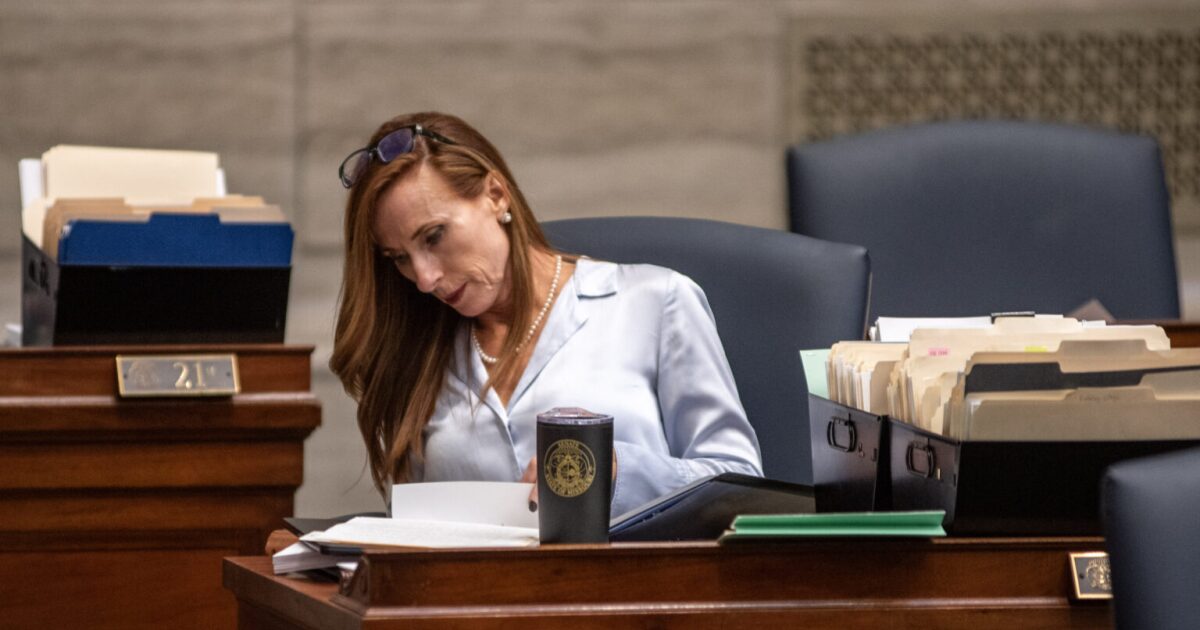Politics
Missouri Senate stalls out after 41-hour filibuster
It took about 10 minutes Monday for the Missouri Senate to devolve into chaos.Members came to the floor for the first time since they adjourned about 4 a.m. Thursday at the end of a 41-hour filibuster by members of the Missouri Freedom Caucus. As soon as the daily preliminaries of a prayer and other matters were completed, Majority Leader Cindy O’Laughlin said she wanted to go to the order of business where the only item on the agenda was the bill that triggered the filibuster.After 10 minutes of state Sen. Bill Eigel yelling that the Senate leadership had again broken their word, O’Laughlin grew weary of the obstruction tactics. She refused to answer questions from EIgel, then a few minutes later adjourned for the day.The chamber was scheduled to reconvene at 9 a.m. Tuesday.In that way, the Senate lost a day crucial to completing the legislature’s constitutionally mandated job of passing the state budget, which must be finished by 6 p.m. Friday. That deadline has been missed only once, in 1997, and any spending bills not finished by that time must be completed in a special session.Eigel, of Weldon Spring, is a candidate for the Republican nomination for governor. He was enraged, Eigel told the Senate, because legislation wasn’t coming up in the order he expected.“This is why I have trust issues,” he said, “because on a regular basis for my eight years, I have been lied to and double crossed at almost every opportunity.”This year’s session has been marked by the worst factional fighting in memory in the state Senate. Members of the Freedom Caucus – six at that time – opened the session by declaring their intent to stall action until their list of demands were met.Those demands are unchanged. They have said a ballot measure that would change how constitutional amendments are approved by raising the majority threshold and a bill banning Planned Parenthood from participating in the state Medicaid program.Three weeks into the session, with little accomplished except lengthy filibusters designed to show how little would be done this year without their cooperation, Eigel and other members of the Freedom Caucus lost their committee chairmanships. Tensions were so high O’Laughlin told editors and publishers in town for a Missouri Press Association event that she was ready to vote to expel Eigel.
Annelise Hanshaw
/
Missouri Independent Missouri State Sen. Bill Eigel, R-Weldon Spring, asks Majority Floor Leader Cindy O’Laughlin about the time to review bills and substitutes on the Senate floor last January in Jefferson City.
Eigel is demanding that the Senate business progress in the order he believes was agreed to as part of a deal to end last week’s filibuster. That would put the 17 budget bills first, followed by the medical provider tax bill and a quick Senate vote on the proposal to change the majority threshold.The budget bills, which are going under heavy revision to make this week’s deadline, wasn’t ready Monday. The eruption came when O’Laughlin tried to move the provider tax bill forward.From O’Laughlin’s point of view, there was no deal made to end the filibuster, just a threat. The threat was to use the Senate’s rule shutting off debate, known as a previous question, O’Laughlin wrote in a Facebook post.It must be a written motion with signatures from 10 members. To pass, it requires 18 votes in the 34-member chamber.“The filibustering Freedom Caucus members were told we had it and if they didn’t sit down we’d use it,” O’Laughlin wrote. “They sat down.”O’Laughlin was not available after the floor session but wrote in the post that the Senate’s top job was to pass the budget. The provider taxes are essential to balancing the budget so that bill is part of the package, she wrote.The Freedom Caucus was using the budget deadline as leverage to force the Senate into a debate on the bill changing the majority standards for constitutional amendments before the budget, she wrote.“This I will not do and is not supported by anyone in the senate other than this little band of chaos causers,” O’Laughlin wrote.Before the Senate adjourned, Eigel asked Sen. Mike Moon of Ash Grove, a lawmaker sympathetic to but not a member of the Freedom Caucus, to back him up on his version of the reason the filibuster ended.Moon said he couldn’t do that because he wasn’t part of the final discussions.He said he thought the provider tax bill was first, followed by the budget and then what is expected to be a lengthy effort by Democrats to kill the changes to how constitutional amendments are approved.“What comes first, I don’t really have any druthers,” Moon said.The last time it was on the floor, Democrats filibustered it successfully until every change they demanded was accepted to allow a vote.The bill returned from the House with every provision Democrats opposed restored.This story was originally published by The Missouri Independent, part of the States Newsroom.
Politics
Missouri keeps child marriage legal as push to ban dies in House

Child marriage will remain legal in Missouri for at least another year after Republican House leaders said they don’t have enough time to pass it.
Under current Missouri law, anyone under 16 is prohibited from getting married. But 16 and 17 year olds can get married with parental consent to anyone under 21.
Under legislation that cleared the Senate with virtually no opposition earlier this year, marriage would be banned for anyone under 18. “It was very surprising that the House has not allowed it to come to the body,” said Republican state Sen. Holly Thompson Rehder of Scott City, who sponsored the bill along with Sen. Lauren Arthur, a Democrat of Kansas City.
“Banning child marriage should not be controversial. When I filed this bill, I had no idea it would be controversial,” Rehder added.
The bill was stalled by a group of Republican critics in a House committee, who said it would constitute government overreach and infringe on parental rights. It finally passed out of committee this week after several of those critics were not present at the vote.
But House leadership told reporters Friday morning it was too late to place the bill on the House calendar for debate. Session ends at 6 p.m.
“There’s some interest there, unfortunately the rules preclude us from doing that today,” said House Majority Leader Jon Patterson, a Lee’s Summit Republican.
Arthur said the failure is “shameful.”
“When I talk to people back home, they’re surprised to learn that minors can get married in the first place,” Arthur said. “And these are the kinds of headlines that my friends who are apolitical or live in different parts of the country send me and say, ‘What is happening in Missouri?’
“It makes us look bad,” she said, “but more importantly, we’re not doing enough to protect young girls who are forced into marriages and their lives are worse in every way as a result.”
Twelve other states have in recent years banned child marriage.
Rehder said she was told only around 20 out of 163 House members were opposed. She also said the House could have voted to suspend its rules to allow the bill to be debated and passed before adjournment, but suggested that House Speaker Dean Plocher refused to let the bill move forward to avoid embarrassing Republicans who are opposed to banning child marriage.
“We have the votes,” Rehder said, but it didn’t come up “because the speaker didn’t want to put his members in a bad situation.”
“…Because you shouldn’t be against banning child marriage.”
Rehder said she’s hopeful the bill will succeed next year, in large part due to the “public pressure” of state and national media.
“You cannot sign a legal binding contract in Missouri until you’re 18. But we’re allowing a parent to sign a child into a lifetime commitment. It’s ridiculous.”
Rehder attributed some of the opposition to generational differences.
“People who have been against it — the men who have been against it — who talk to me about it have said, ‘Oh, my grandmother got married at 15.’ Well, yes I did too, mine was 40 years ago,” Rehder said.
“And it didn’t work out because I was operating on not an adult mindset.”
Fraidy Reiss, an activist who founded the nonprofit against forced marriage Unchained at Last was active in testifying in support of the bill in Missouri and has worked nationally to pass similar legislation. Upon hearing the news, Reiss said: “How can legislators live with themselves?”
She added that “dozens of teens will be subjected to a human rights abuse and legally trafficked under the guise of marriage in the coming year,” due to the failure to pass the legislation.
“…How will they explain that to their constituents?”
This story was originally published by the Missouri Independent, part of the States Newsroom.
Politics
Missouri Legislature passes fix to property tax freeze law
One year after they passed the original legislation, Missouri legislators have approved a fix to a law allowing property tax freezes for seniors.Members of the House voted 139-0 Friday to pass the bill. Since it has already gone through the Senate, it now goes to Gov. Mike Parson.The current law allows local governments to pass ordinances that would freeze property taxes for seniors. It also would allow voters to approve such an ordinance.St. Charles and St. Louis counties, as well as the City of St. Louis, have already passed their own ordinances on the issue.The way the law is structured now, only seniors who receive Social Security would be eligible for a property tax freeze. That requirement has left out seniors who are on pensions like police officers and firefighters.Sen. Tony Luetkemeyer, R-Parkville, sponsored both the original bill and the changes this session.“Rather than tying eligibility of the property tax freeze to Social Security eligibility, we instead tied it just to age,” Luetkemeyer said.Rep. Ben Keathley, R-Chesterfield, said the legislature did the first part of the job last year.“Now it’s time to make sure that this language clarifies and we can properly expand this to make sure all our seniors can benefit,” Keathley said.The freeze would still only be applicable in municipalities that have approved an ordinance.One provision that some Democrats wanted to add this session was a means test, under which seniors with higher incomes would not qualify for the freeze.That language was not added to the final bill.
Politics
Missouri legislature passes anti-ranked choice voting resolution

The Missouri legislature has passed a proposed constitutional amendment that, if approved by voters, would prohibit ranked choice voting in most of the state.Members of the House voted 97-43 Friday to pass the resolution. It has already cleared the Senate and does not need the approval of Gov. Mike Parson.The resolution states that under no circumstances “shall a voter be permitted to cast a ballot in a manner that results in the ranking of candidates for a particular office.”The resolution has a carve-out for St. Louis, which implemented an approval voting system in 2020 for its municipal elections.Through this system, voters can select as many candidates as they want in a primary. The top two candidates then go to a runoff election.The proposed constitutional amendment would not affect St. Louis’ system.Rep. Ben Baker, R-Neosho, sponsored the House version of the resolution. He said he was not in favor of the exception for St. Louis.“I’m not OK with it, but this is where we’re at with this language of what we can get done in the body. I think it’s still a big step in the right direction,” Baker said.In speaking against the resolution, Rep. Eric Woods, D-Kansas City, said it was unnecessary and not the way to reassure people about election results.“There are other ways, other systems, other ideas that we can adopt to keep our democracy or our republic, whichever word you want to prefer to use, vibrant,” Woods said.In addition to the ban on ranked choice voting, the resolution states that the candidate who receives the most votes in a political party primary will be the only candidate on the ballot for November for that party.The resolution states that all elections will be by paper ballot or by “any mechanical method prescribed by law.”Included within the proposed resolution is language stating that only U.S. citizens who are 18 or older, residents of Missouri and residents of the political subdivision they vote in are entitled to vote in elections. That language does not make any changes to existing law.Similar language has been a point of contention all session, where it has been in the same conversation as an amendment that sought to make it harder to amend the constitution.Democrats have stated all session this language was being added by Republicans to trick voters into approving it. Senate Democrats filibustered for about 50 hours, eventually killing those proposed constitutional changes.
-

 Entertainment1 year ago
Entertainment1 year agoSt.Louis Man Sounds Just Like Whitley Hewsten, Plans on Performing At The Shayfitz Arena.
-

 Business1 year ago
Business1 year agoWe Live Here Auténtico! | The Hispanic Chamber | Community and Connection Central
-
Board Bills1 year ago
2022-2023 Board Bill 189 — Public Works and Improvement Program at the Airport
-

 Local News1 year ago
Local News1 year agoVIDEO: St. Louis Visitor Has Meltdown on TikTok Over Gunshots
-

 News1 year ago
News1 year agoTed Lasso-inspired pop-up bar now open in St. Louis
-

 Board Bills1 year ago
Board Bills1 year ago2022-2023 Board Bill 165 — Jefferson Arms Community Improvement District
-
Board Bills1 year ago
2022-2023 Board Bill 183 — Amending Ordinance Number 62885 known as the Capital Improvements Sales Tax
-

 News10 months ago
News10 months agoGas tanker crashes into St. Louis Metro transit center





